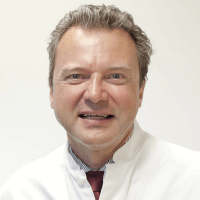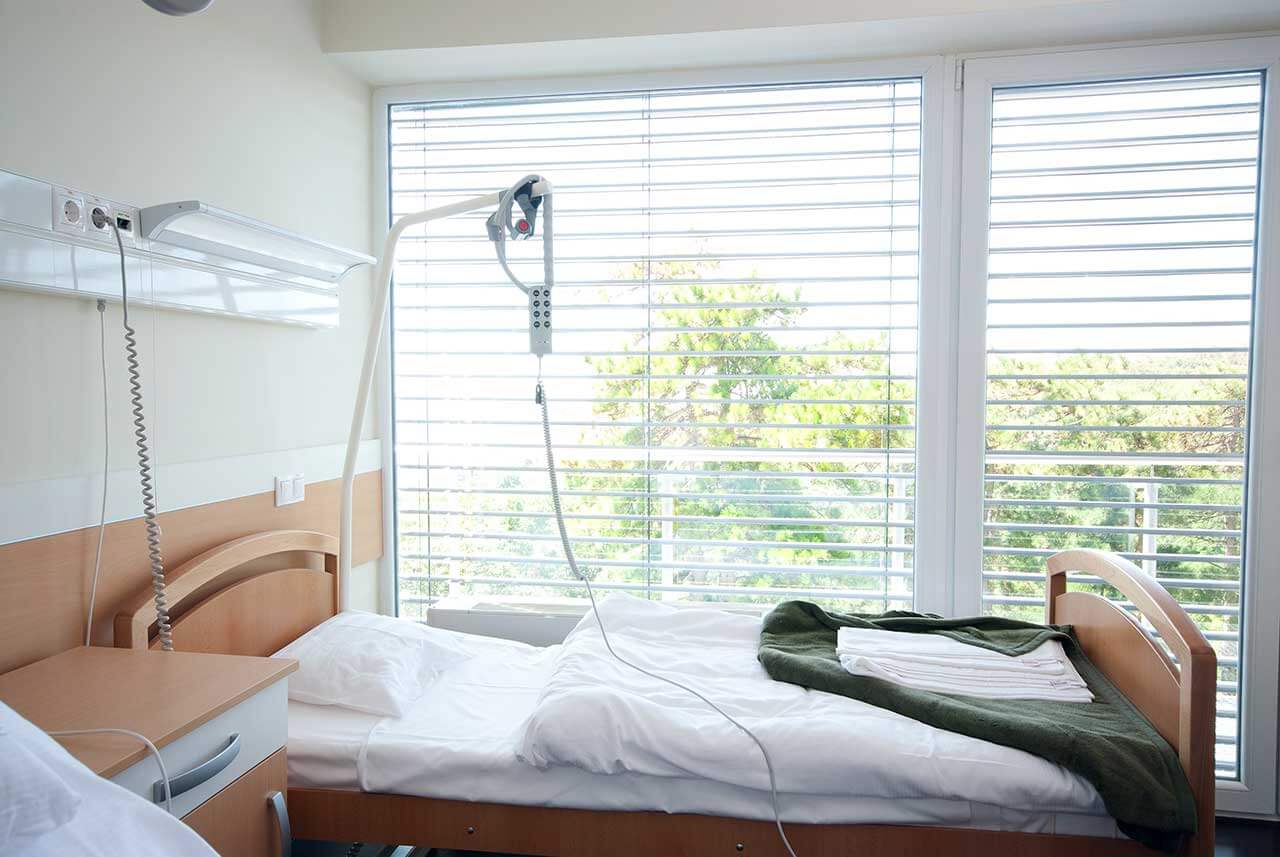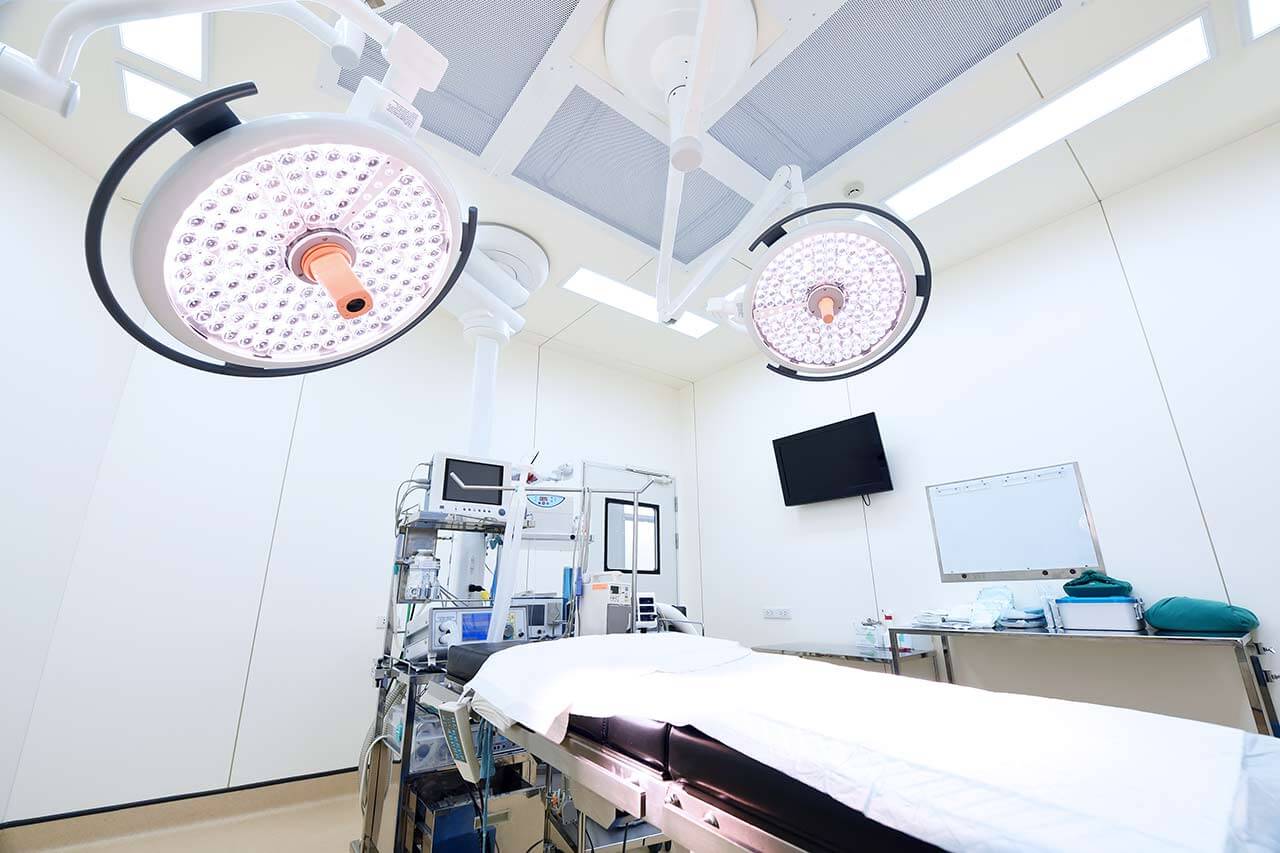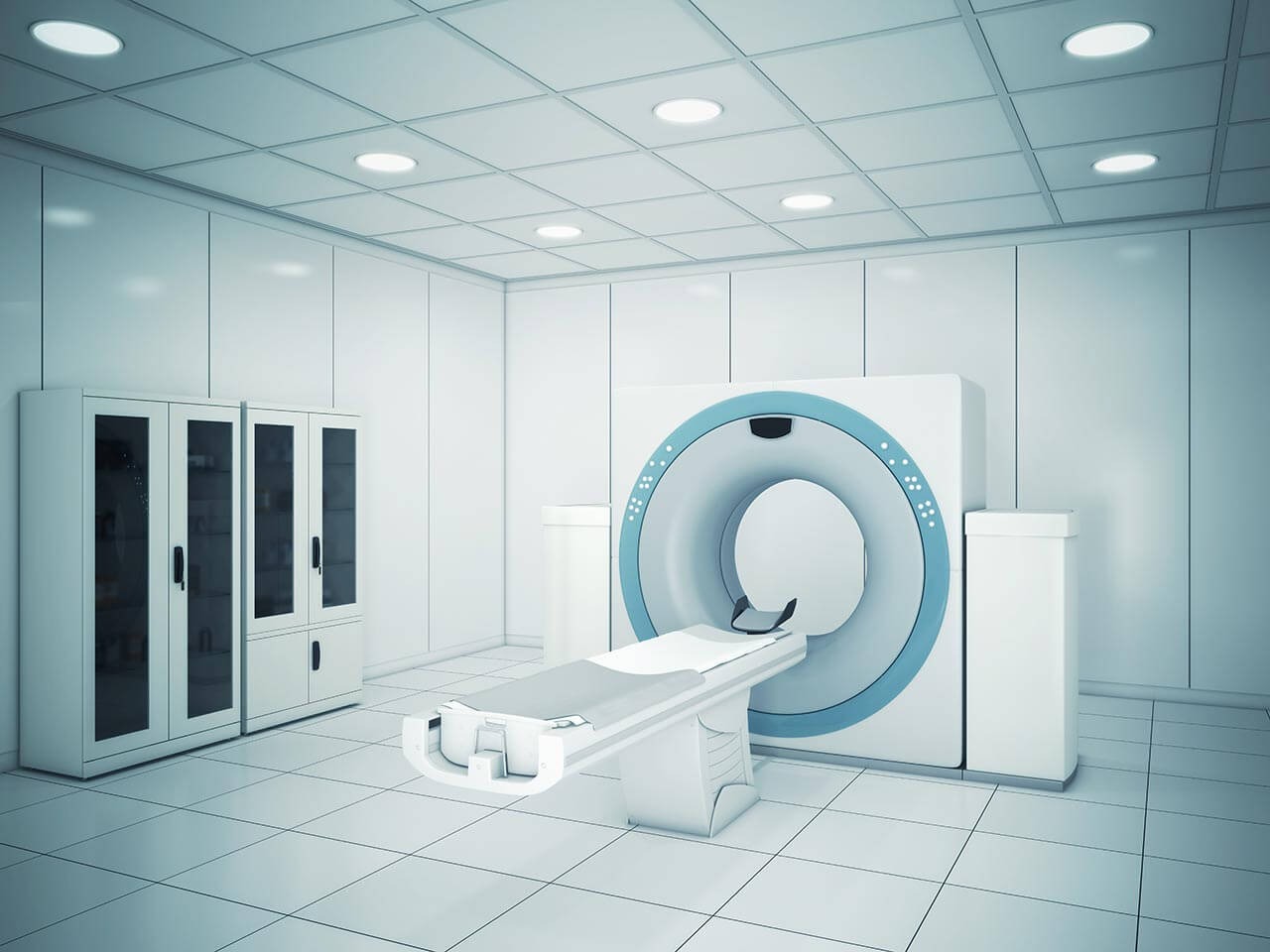
The program includes:
- Initial presentation in the clinic
- clinical history taking
- review of medical records
- physical examination
- laboratory tests:
- complete blood count
- general urine analysis
- biochemical analysis of blood
- inflammation indicators (CRP, ESR)
- indicators blood coagulation
- tumor markers (CEA, CA19-9, CA125)
- gynecological examination:
- ultrasound examination: pelvis, abdomen
- CT/MRI of the abdomen and pelvis
- preoperative care
- hysterectomy
- histologically and immunohistochemically
examination of the remote tissues - symptomatic treatment
- control examinations
- the cost of essential medicines and materials
- nursing services
- full hospital accommodation
- explanation of future recommendations
Required documents
- Medical records
- MRI/CT scan (not older than 3 months)
- Biopsy results (if available)
Service
You may also book:
 BookingHealth Price from:
BookingHealth Price from:
About the department
The Department of Gynecology, Obstetrics and Mammology at the Marienhaus Hospital St. Elisabeth Neuwied offers all the possibilities of modern medicine for the diagnostics and treatment of diseases of the female reproductive system and breast. Special attention is paid to the medical care of patients with gynecologic and breast cancers. The department also treats all benign diseases of the female genitalia. Surgical interventions on the female reproductive system are most often performed using endoscopic and minimally invasive techniques, which ensure not only effectiveness but also the safest possible treatment. Breast cancer is diagnosed and treated in the specialized Breast Center, which has been certified since 2007 in accordance with the requirements of the German Cancer Society (DKG) and the German Society of Senology (DGS). A team of obstetricians and perinatal medicine specialists takes care of the safe course of pregnancy as well as successful childbirth and the health of both mother and baby. Childbirth takes place in comfortable delivery rooms. There is a possibility of water birth. More than 2,000 babies are born here every year. Highly qualified doctors, who have in their arsenal state-of-the-art medical equipment and effective diagnostic and treatment methods, treat patients in the department. The department is headed by Prof. Dr. med. Richard Berger.
The department's gynecologists are deservedly proud of their rich and successful experience in the treatment of female reproductive cancers. Treatment takes place in a specialized center that is certified by the German Cancer Society (DKG). The most common diagnoses include uterine, ovarian, fallopian tube, vaginal, and vulvar cancers. All these pathologies require a comprehensive approach, so gynecologists, surgeons, radiation therapists, radiologists, nuclear medicine specialists, and other experts are engaged in the therapeutic process. The work of psycho-oncologists plays an equally important role in achieving a successful treatment outcome because many women find it difficult to accept their diagnosis and cope with depressive states. Treatment tactics for each patient are determined on an individual basis during weekly tumor boards. Treatment regimens comply with current national and international recommendations. As a rule, the first-line treatment is surgical resection of the malignant tumor. If the cancer process has spread, it may be necessary to remove the affected organ (for example, the uterus or ovaries), lymph nodes, and other adjacent anatomical structures. Doctors carry out conservative treatment to completely eliminate malignant cells, including chemotherapy, radiation therapy, targeted therapy, hormone therapy, antibody therapy, and immunotherapy.
The department admits patients with benign gynecologic diseases, the most common of which are uterine myomas, endometriosis, cervical dysplasia, ovarian cysts, and infectious diseases of the female reproductive system. In the early stages of benign gynecologic diseases, the department's doctors often manage to carry out conservative treatment, but in more complicated cases, surgical intervention is often required. Surgery for the above-mentioned diseases is usually performed using minimally traumatic endoscopic or laparoscopic techniques.
The department houses a highly specialized Breast Center, which is responsible for the diagnostics and treatment of breast diseases. The center focuses on patients with breast cancer. The Breast Center is certified in compliance with the requirements of the German Cancer Society (DKG) and the German Society of Senology (DGS), which guarantees top-class medical care for patients. The department's surgeons use the very latest and most sparing surgical techniques, which allow them to preserve breasts in 75% of patients. After complete breast removal surgery, doctors use advanced reconstructive techniques to restore a woman's attractive appearance. Depending on the stage and type of cancer, the patient is prescribed conservative treatment. As a rule, a treatment regimen includes chemotherapy. If hormone-dependent breast cancer is detected, the department's specialists also prescribe hormone therapy. If clinically indicated, doctors also perform irradiation, targeted therapy, and immunotherapy.
An integral part of the department's clinical practice is perinatal medicine and obstetrics. The department has the status of a Level I Perinatal Center. More than 2,000 babies are born here every year, making it the largest Obstetric Center in the state of Rhineland-Palatinate. Competent obstetricians have successful experience managing multiple pregnancies and high-risk pregnancies. Newborns weighing less than 1,500 grams also receive medical care here. Modern delivery rooms are equipped with everything necessary for a comfortable and safe childbirth. Women may have pain management with acupuncture or epidural anesthesia, if required. Water births are also available here. The department also performs C-sections using sparing surgical techniques.
Since the beginning of 2010, the department has been actively cooperating with the Clinic for Prenatal Medicine and Clinical Genetics in Meckenheim-Bonn-Neuwied. The clinic's doctors regularly hold outpatient consultations. They use the very latest methods of prenatal diagnostics, including ultrasound scans and fetal echocardiography. In most cases, this allows for the optimal planning of postnatal treatment for the child.
The department's range of medical services includes:
- Gynecology
- Gynecologic oncology
- Diagnostic options
- Imaging diagnostics: high-resolution ultrasound, computed tomography, including CT-guided biopsy, magnetic resonance imaging, and scintigraphy
- Sentinel lymph node biopsy
- Therapeutic options
- Cancer surgery with a focus on minimally invasive surgical techniques (extended hysterectomy and lymph node removal)
- Multivisceral resections for extensive abdominal lesions caused by gynecologic cancer, followed by reconstruction of several organs, plastic reconstructive surgery of the vulva and vagina, and removal of sentinel lymph nodes
- Radiation therapy (modern techniques with personalized 3D planning)
- Systemic therapy: chemotherapy, targeted therapy, hormone therapy, antibody therapy, and immunotherapy
- Inpatient and outpatient palliative care
- Diagnostic options
- General gynecology
- Hysteroscopy
- Endometrial ablation
- Endometrial polyp removal surgery
- Uterine fibroid removal surgery
- Laparoscopy
- Ovarian surgery
- Laparoscopic adhesion division (adhesiolysis)
- Uterine fibroid enucleation
- Pathological endometrial foci resection
- Total laparoscopic hysterectomy
- Laparoscopic supracervical hysterectomy
- Hysteroscopy
- Gynecologic oncology
- Mammology
- Diagnostic options
- Preoperative diagnostics, including mammography, sonography, magnetic resonance imaging, and preoperative image-guided biopsy
- Mammography screening
- Genetic diagnostics in collaboration with external partners
- Therapeutic options
- Surgical resection of breast tumors (focus on breast-conserving surgery)
- Adjuvant and neoadjuvant hormone therapy, immunotherapy, and chemotherapy
- Radiation therapy
- Inpatient and outpatient palliative care
- Diagnostic options
- Obstetrics
- Comprehensive management of pregnancy
- Childbirth (natural births, including water births, and C-section)
- Pain management during childbirth
- Postnatal care for mother and baby
- Other diagnostic and therapeutic options
Curriculum vitae
Higher Education and Professional Career
- 1981 - 1987 Study of Medicine at Ludwig Maximilian University of Munich.
- 1987 State medical examination.
- 1989 Doctoral thesis defense.
- 1995 Board certification in Gynecology and Obstetrics.
- 1996 Habilitation in Gynecology and Obstetrics.
- 2002 Extraordinary Professorship in Gynecologic Oncology and Special Obstetrics, Perinatal Medicine.
Clinical Focuses
- Perinatology.
- Senology.
- Gynecologic Oncology.
Memberships in Professional Societies
- Society for Gynecologic Investigation.
- German Society of Gynecology and Obstetrics.
- German Society of Senology.
- German Society of Perinatal Medicine.
- German Continence Society.
- Working Group on Obstetrics of the German Society of Gynecology and Obstetrics.
- Rhineland-Palatinate Cancer Society.
Honors
- As the winner of 18 international and national awards and prizes, Prof. Berger ranks among the top physicians in "Who is who in the world" list and on www.die-besten-nennen.de.
Photo of the doctor: (c) Marienhaus Kliniken GmbH
About hospital
The Marienhaus Hospital St. Elisabeth Neuwied is an advanced health facility with an excellent reputation in the national medical arena. It is the largest medical complex in the state of Rhineland-Palatinate. The Marienhaus Hospital St. Elisabeth Neuwied is an academic hospital of Johannes Gutenberg University Mainz and an academic hospital of Maastricht University in the Netherlands. The status of an academic hospital provides access to the very latest achievements of European medicine in diagnostics and treatment. The health of patients is in the safe hands of a highly qualified team of doctors and nursing staff. The specialists make every effort to provide each patient with the most effective and personalized care in comfortable conditions.
The hospital has 11 specialized departments, as well as day clinics, outpatient clinics, and specialized centers. Clinical practice offers such medical fields as general surgery, abdominal surgery, vascular surgery, gynecology, obstetrics, radiology, gastroenterology, diabetology, cardiology, trauma surgery, urology, spinal surgery, and pediatric and adolescent medicine.
The hospital has 429 beds for an inpatient hospital stay. The health facility admits about 19,000 inpatients and more than 35,000 outpatients annually. The hospital's specialists provide comprehensive and high-quality medical care focused on meeting the specific needs and wishes of each patient.
The hospital implemented an effective quality control system corresponding to ISO 9001 standards more than 15 years ago. The purpose of this system is to provide continuous and patient-oriented monitoring of medical and administrative processes.
Many departments in the hospital have been awarded prestigious quality certificates, including a certificate from the German Cancer Society (DKG) for the treatment of breast and gynecological cancers, a certificate from the German Cardiac Society (DGK) for the treatment of acute coronary syndrome, an EndoCert certificate for joint replacement surgery, a certificate from the German Society of Vascular Surgery (DGG), and others.
Photo: (с) depositphotos
Accommodation in hospital
Patients rooms
The patients of the Marienhaus Hospital St. Elisabeth Neuwied live in single or double rooms. All patient rooms are comfortable and designed in light colors. Each patient room has an ensuite bathroom with a shower and a toilet. The patient room furnishings include an automatically adjustable bed, a bedside table, a table and chairs for receiving visitors, a wardrobe for storing personal belongings, a telephone, and a TV. Wi-Fi access is also available throughout the hospital. Most patient rooms in the hospital have large panoramic windows, offering a beautiful view.
If desired, patients can live in enhanced-comfort rooms. Such rooms are more spacious, and they are additionally equipped with a mini-fridge, a safe, and upholstered furniture. The bathroom has a hairdryer, a cosmetic mirror, towels, a bathrobe, and toiletries.
Meals and Menus
The patients of the hospital are offered three tasty meals a day: breakfast, lunch, and dinner. There is a choice of several lunch menu options every day. Breakfast and dinner are served buffet-style, allowing patients to choose meals independently. The menu also includes daily options for dietary and vegetarian meals. Individual menus are provided for patients as well, if necessary.
The patients staying in enhanced-comfort rooms are offered tea, coffee, and juices, as well as fresh fruits and snacks, in addition to a varied three meals a day.
The hospital also houses a cozy cafe. The menu includes complex breakfasts and lunches, salads, snacks, desserts, and hot and cold drinks.
Further details
Standard rooms include:
Accompanying person
The accompanying person may stay with you in the patient room or at the hotel of your choice during the inpatient program.
Hotel
You may stay at the hotel of your choice during the outpatient program. Our manager will help you choose the best option.




